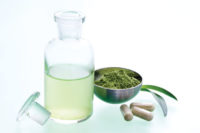Green Tea Extract for Treating Malaria
A study shows green tea extracts have a positive impact in treating malaria, in vitro.

In the Italy-based study, the scientists found that "...a crude extract of green tea as well as two of its main constituents, epigallocatechin-3-gallate (EGCG) and epicatechin gallate (ECG), strongly inhibit Plasmodium falciparum growth in vitro. Both these catechins are found to potentiate the antimalarial effects of artemisinin (a key malaria treatment) without interfering with the folate pathway." Moreover, the tests showed that the combination of artemisinin and the green tea catechins displayed a strong combined effect.
Interestingly, while in previous studies Plandaí confirmed the same effect, in its most recent tests, the company recently announced incredible results from its second round of in vitro testing of the ingredient, used to kill the malaria parasite plasmodium falciparum. The results of this independent investigation confirmed a 12-times greater efficacy in killing the parasite.
Since malaria is not a disease that affects people in most Western nations, many people are unaware of the reach of this deadly disease which potentially impacts hundreds of millions of people and kills 600,000 in the African continent alone. As a result, success in developing a highly effective commercial botanical extract to treat malaria is a very lucrative and therapeutic opportunity for Plandaí.
Looking for a reprint of this article?
From high-res PDFs to custom plaques, order your copy today!




